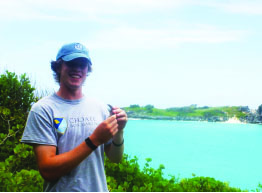
Dylan Muldoon ’17 spent the summer in Bermuda for his research, titled, ‘Populations and Polymorphisms: A New Look at the Bermuda Skink’.
For students who dream about vaporizing metal into nanoparticles or finding ways to cure cancer, Choate offers the Science Research Program (SRP). A selective Signature Program, SRP aims to arm students with the skills needed to perform professional experiments. Students apply to one or both sections, quantitative or biology, depending on their interests.
Regardless of their section, all SRP students must secure an eight- to twelve-week summer internship in a professional laboratory. Although the internship represents a fraction of the time students are involved in SRP, it is the core of the program.
As Dr. Christopher Hogue, who teaches the quantitative section, noted, “The entire junior year is a build-up to prepare students to be ready when they go into a professional research lab in the summer so that they can contribute in meaningful ways.”
The projects of each student vary immensely, even within a section. For example, Nathan Chang ’17, a student in the biology section, interned at a lab that researches breast cancer. He grew the cancer cells and then doused them with a chemical to examine how many died. Chang said, “An important piece of understanding how to treat cancer better is understanding how cancer cells die.”
In contrast, during her internship for the biology section, Alyssa Zhou ’17 examined how neomycin, an antibiotic, affects inner ear hair cells of genetically modified zebra fish.
She explained, “We’re trying to figure out ways to prevent damage of the hair cells, because hair cell damage is permanent, so once you’re deaf, you’re deaf for your entire life.”
Meanwhile, as part of the quantitative section, Anna Ekholm ’17 worked on quantitative proteomics during her internship. What on earth is quantitative proteomics?
Ekholm explained, “Basically, I studied the proteins in a human. Not all of them, because not all of them are interesting.” She continued, “I had a plasma sample, and 99% of it is super boring. The stuff you care about is in the bottom 1%.”
Ekholm used antibodies to isolate the proteins she wanted, and then she ran those proteins through a mass spectrometer to count them.
Also in the quantitative section, Weston Miller ’17 completed his internship at a mechanical engineering lab. Miller’s experiment embodied the inner yearning of every science fiction geek: vaporizing a metal nitrate dissolved in liquid into nanoparticles using an electrostatic atomization technique.
One application for these nanoparticles is using them to make lithium ion batteries that can last a long time without being charged. “As opposed to having to charge your phone every night, you’d maybe only need to charge your phone once a month,” Miller said.
It is perhaps important to note that even though SRP students often intern at cutting-edge labs, their experiments are not bursting with constant excitement and discovery.
According to Chang, a lot of waiting is involved: “You have to wait for the cells to grow; you have to wait for the cells to die.”
Moreover, Dr. Hogue added, “In science research, a large part of it is failure, failure, failure, failure, teeny tiny bit of success, failure, failure, failure, failure, teeny tiny bit of success.”
Even so, that “teeny tiny bit of success” is enough to fuel the motivated lab scientist into further inquiries.
After a summer filled with so many internships, the senior SRP students are currently preparing a series of presentations that will be open to the entire Choate community toward the end of the fall term. Zhou highlighted how helpful SRP has been in improving her public speaking skills. “For the past two weeks we’ve been practicing giving our presentations one-by-one, over and over again,” she said.
While the seniors reach the end of their projects, the juniors are filled with anticipation for the year and summer to come. Alan Luo ’18 is hoping to find a lab where he can immerse himself in the world of quantum computing. He explained, “I think it’s really cool to be studying something that you can’t just Google search and find an answer to. You actually have to dig kind of deeply.”
Although the specific interests of SRP students are completely different from each other, in the end, the program brings students together for the celebration of science. Whether the students bond with their lab partners over unintentionally putting aluminum foil in a microwave (yes, that actually happened at a professional lab) or bond with their classmates while giving each other feedback on their presentations, every student finishes the program with a better understanding of laboratory science.




